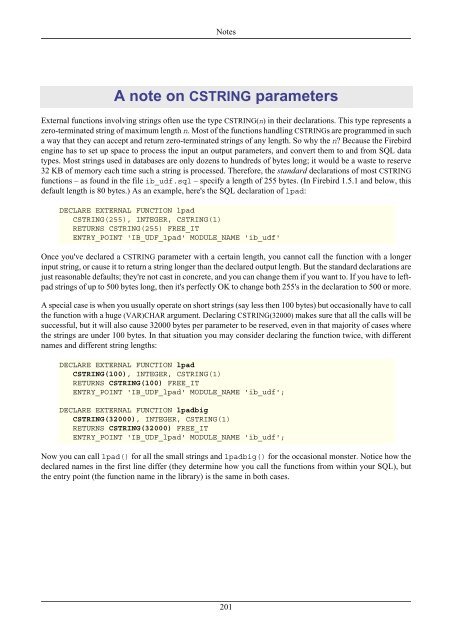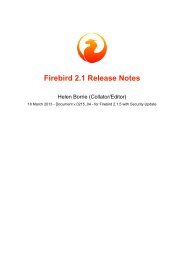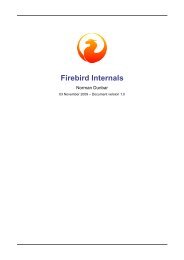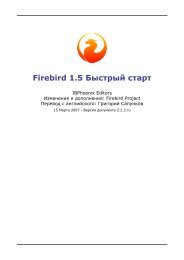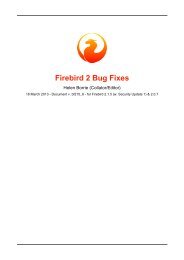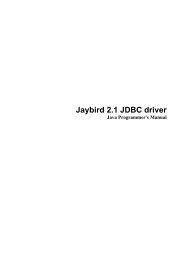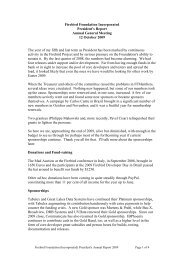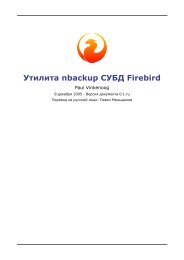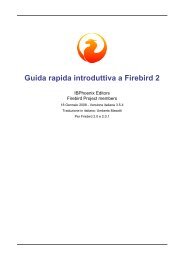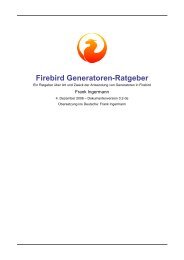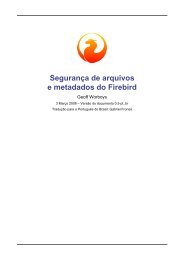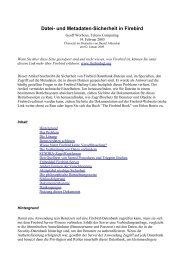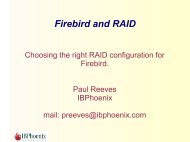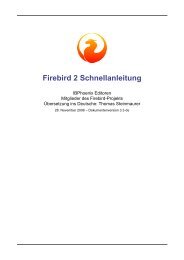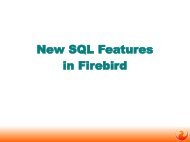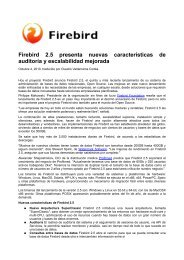Firebird 2.1 Language Reference Update
Firebird 2.1 Language Reference Update
Firebird 2.1 Language Reference Update
Create successful ePaper yourself
Turn your PDF publications into a flip-book with our unique Google optimized e-Paper software.
Notes<br />
A note on CSTRING parameters<br />
External functions involving strings often use the type CSTRING(n) in their declarations. This type represents a<br />
zero-terminated string of maximum length n. Most of the functions handling CSTRINGs are programmed in such<br />
a way that they can accept and return zero-terminated strings of any length. So why the n? Because the <strong>Firebird</strong><br />
engine has to set up space to process the input an output parameters, and convert them to and from SQL data<br />
types. Most strings used in databases are only dozens to hundreds of bytes long; it would be a waste to reserve<br />
32 KB of memory each time such a string is processed. Therefore, the standard declarations of most CSTRING<br />
functions – as found in the file ib_udf.sql – specify a length of 255 bytes. (In <strong>Firebird</strong> 1.5.1 and below, this<br />
default length is 80 bytes.) As an example, here's the SQL declaration of lpad:<br />
DECLARE EXTERNAL FUNCTION lpad<br />
CSTRING(255), INTEGER, CSTRING(1)<br />
RETURNS CSTRING(255) FREE_IT<br />
ENTRY_POINT 'IB_UDF_lpad' MODULE_NAME 'ib_udf'<br />
Once you've declared a CSTRING parameter with a certain length, you cannot call the function with a longer<br />
input string, or cause it to return a string longer than the declared output length. But the standard declarations are<br />
just reasonable defaults; they're not cast in concrete, and you can change them if you want to. If you have to leftpad<br />
strings of up to 500 bytes long, then it's perfectly OK to change both 255's in the declaration to 500 or more.<br />
A special case is when you usually operate on short strings (say less then 100 bytes) but occasionally have to call<br />
the function with a huge (VAR)CHAR argument. Declaring CSTRING(32000) makes sure that all the calls will be<br />
successful, but it will also cause 32000 bytes per parameter to be reserved, even in that majority of cases where<br />
the strings are under 100 bytes. In that situation you may consider declaring the function twice, with different<br />
names and different string lengths:<br />
DECLARE EXTERNAL FUNCTION lpad<br />
CSTRING(100), INTEGER, CSTRING(1)<br />
RETURNS CSTRING(100) FREE_IT<br />
ENTRY_POINT 'IB_UDF_lpad' MODULE_NAME 'ib_udf';<br />
DECLARE EXTERNAL FUNCTION lpadbig<br />
CSTRING(32000), INTEGER, CSTRING(1)<br />
RETURNS CSTRING(32000) FREE_IT<br />
ENTRY_POINT 'IB_UDF_lpad' MODULE_NAME 'ib_udf';<br />
Now you can call lpad() for all the small strings and lpadbig() for the occasional monster. Notice how the<br />
declared names in the first line differ (they determine how you call the functions from within your SQL), but<br />
the entry point (the function name in the library) is the same in both cases.<br />
201


